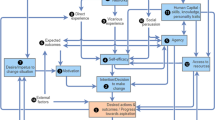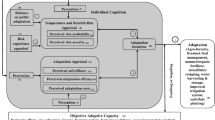Abstract
Psychology has great potential for contributing to rural development, particularly through supporting rural extension (RE). In this paper, the types of expectations extensionists have of psychology are identified, as well as possible ways of integrating psychosocial knowledge into the RE context. Rural extensionists from 12 Latin American countries were surveyed (n = 654). Of them, 89.4 % considered psychology could contribute to rural extension and commented on how this would be possible. Expectations were categorised and the nine mentioned by more than 20 % of them were utilized to conduct a two-steps cluster analysis. Three types of extensionists’ expectations were identified: one wherein working with extensionists was highlighted; another characterised by a focus on working with farmers; and a third featuring a traditional, diffusionist extension approach, which views farmers as objects of psychologists’ interventions. With the first type, psychologists should not neglect working with farmers and with the second, with extensionists. With the third type, reflecting on the expectations themselves and their underlying assumptions seems essential.

Similar content being viewed by others
References
Acunzo, M., Pafumi, M., Torres, C., & Tirol, M. (2014). Communication for rural development. Rome: Food and Agriculture Oganization of the United Nations (FAO).
Álvarez, S. (2001). Pobreza autogestionada. Encrucijadas, 14(2), 32–43.
American Psychological Association (2010). Ethical principles of psychologists and code of conduct. Retrieved from http://apa.org/ethics/code/principles.pdf.
Anyaegbunam, C., Mefalopulos, P., & Moetsabi, T. (2004). Participatory rural communication appraisal. Starting with the people, a handbook. Rome: FAO.
Belder, P., Rohrbach, D., Twomlow, S., & Senzanje, A. (2007). Can drip irrigation improve the livelihoods of smallholders? Lessons learned from Zimbabwe. Bulawayo: International Crops Research Institute for the Semi-Arid Tropics.
Bouwen, R., & Taillieu, T. (2004). Multi-party collaboration as social learning for interdependence: developing relational knowing for sustainable natural resource management. Journal of Community and Applied Social Psychology, 14(3), 137–153.
Cazorla, A., De los Ríos, I., & Salvo, M. (2013). Working with people (WWP) in rural development projects: a proposal from social learning. Cuadernos de Desarrollo Rural, 10(70), 131–157.
Chambers, R. (1983). Rural development. Putting the last first. New York: Longman.
Choocharoen, C., Neef, A., Preechapanya, P., & Hoffmann, V. (2014). Agrosilvopastoral systems in Northern Thailand and Northern Laos: minority peoples’ knowledge versus government policy. Land, 3(2), 414–436.
Chowdhury, A., Hambly Odame, H., & Leeuwis, C. (2014). Transforming the roles of a public extension agency to strengthen innovation: Lessons from the National Agricultural Extension Project in Bangladesh. The Journal of Agricultural Education and Extension, 20(1), 7–25.
Christoplos, I. (2010). Movilizing the potencial of rural and agricultural extension. Rome: FAO.
Dirven, M. (2003). Entre el ideario y la realidad: capital social y desarrollo agrícola, algunos apuntes para la reflexión. In R. Atria, M. Siles, I. Arriagada, L. Robison, & S. Whiteford (Eds.), Capital social y reducción de la pobreza en América Latina y el Caribe: en busca de un nuevo paradigma (pp. 397–446). Santiago: Economic Commission for Latin America and the Caribbean.
Freire, P. (1973). ¿Extensión o comunicación? La concientización en el medio rural. Siglo XXI: Buenos Aires.
Gazzoli, P. (2012). Comunidades de prática enquanto viabilizadoras de projetos comuns em ambientes turbulentos: uma abordagem crítica. Revista de Administração Contemporânea, 16(6), 806–826.
Global Forum for Rural Advisory Services (2012). Marco estratégico a largo plazo (2011–2016). Lindau. Retrieved from http://www.g-fras.org/en/knowledge/documents/category/16-strategic-and-management-documents.html?download=128:gfras-marco-estrategico.
Hutchison, A., Johnston, L., & Breckon, J. (2011). Grounded theory-based research within exercise psychology: a critical review. Qualitative Research in Psychology, 8(3), 247–272.
Kim, H., MacDonald, R., & Andersen, D. (2013). Simulation and managerial decision making: a double-loop learning framework. Public Administration Review, 73(2), 291–300.
Klerkx, L., Aarts, N., & Leeuwis, C. (2010). Adaptive management in agricultural innovation systems: the interactions between innovation networks and their environment. Agricultural Systems, 103, 390–400.
Landini, F. (2011) Racionalidad económica campesina. Mundo Agrario, 12(23). Retrieved from http://www.scielo.org.ar/pdf/magr/v12n23/v12n23a14.pdf.
Landini, F. (Ed.). (2015a). Hacia una psicología rural latinoamericana. Latin American Council of Social Sciences (CLACSO): Buenos Aires.
Landini, F. (2015b). Different Argentine rural extensionists’ mindsets and their practical implications. The Journal of Agricultural Education and Extension, 21(3), 219–234.
Landini, F. (2015c). Contributions of community psychology to rural advisory services: an analysis of Latin American rural extensionists’ point of view. American Journal of Community Psychology, 55(3), 359–368.
Landini, F. (2016). Concepción de extensión rural en 10 países latinoamericanos. Andamios, 24(47), 47–68.
Landini, F., & Bianqui, V. (2013). Reflecting on practice. Farming Matters, 29(3), 34–36.
Landini, F., & Bianqui, V. (2014). Socio-demographic profile of different samples of Latin American rural extensionists. Ciencia Rural, 44(3), 575–581.
Landini, F. & Riet, L. (2015). Extensión rural en Uruguay: problemas y enfoques vistos por sus extensionistas. Mundo Agrario, 16(32). Retrieved from http://www.mundoagrario.unlp.edu.ar/article/view/MAv16n32a09/6862.
Landini, F., Murtagh, M., & Lacanna, M. (2009). Aportes y reflexiones desde la psicología al trabajo de extensión con pequeños productores. Formosa: National Institute for Agrarian Technology.
Landini, F., Benítez, M., & Murtagh, S. (2010). Revisión de los trabajos realizados por la psicología sobre pequeños productores agropecuarios. Anuario de Investigaciones, 17(1), 221–229.
Landini, F., Bianqui, V., & Crespi, M. (2013a). Evaluación de las creencias sobre extensión rural de los extensionistas paraguayos. Psiencia, 5(1), 3–14.
Landini, F., Bianqui, V., & Russo, M. (2013b). Evaluación de un proceso de capacitación para extensionistas rurales implementado en Paraguay. Revista de Economia e Sociologia Rural, 51(sup1), s009–s030.
Landini, F., Leeuwis, C., Long, N., & Murtagh, S. (2014a). Towards a psychology of rural development processes and interventions. Journal of Community and Applied Social Psychology, 24(6), 534–546.
Landini, F., Long, N., Leeuwis, C., & Murtagh, S. (2014b). Theoretical guidelines for a psychology of rural development processes and interventions. Cuadernos de Desarrollo Rural, 11(74), 125–147.
Leeuwis, C. (2004). Communication for rural innovation. Rethinking agricultural extension. Oxford: Blackwell Science.
Leeuwis, C., & Aarts, N. (2011). Rethinking communication in innovation processes: creating space for change in complex systems. Journal of Agricultural Education and Extension, 17(1), 21–36.
Leeuwis, C., & Pyburn, R. (Eds.). (2002). Wheelbarrows full of frogs. Social learning in rural resource management. Assen: Van Gorcum.
Leite, J., & Dimensteinm, M. (Eds.). (2013). Psicologia e contextos rurais. Natal: Federal Univesity of Rio Grande do Norte.
Leite, J., Silva, L., Oliveira, R., & Stipp, M. (2012). Thoughts regarding researchers utilizing grounded theory. Revista da Escola de Enfermagem da USP, 46(3), 765–769.
Long, N. (2001). Development sociology. Actor perspectives. London: Routledge.
Marchesan, E., & Senseman, S. (2010). Brazilian university technology transfer to rural areas. Ciência Rural, 40(10), 2243–248.
Montero, M., & Winkler, M. (2014). Iberian and Latin American ethics in community psychology: the contradiction between facts and academician’s perception. Journal of Community Psychology, 42(8), 997–1014.
Moschitz, H., Roep, D., Brunori, G., & Tisenkopfs, T. (2015). Learning and innovation networks for sustainable agriculture: processes of co-evolution, joint reflection and facilitation. The Journal of Agricultural Education and Extension, 21(1), 1–11.
Murtagh, S., & Landini, F. (2011). Producción científica de la psicología vinculada a pequeños productores agropecuarios con énfasis en el ámbito del desarrollo rural. Interamerican Journal of Psychology, 45(2), 293–304.
Ortiz, R. (2009). Evolución de los servicios de extensión en Nicaragua. Rome: FAO.
Ortiz, R., Mejía, F., Ceville, X., Preissing, J., Boerger, V., Solórzano, N., Meyrat, M., Marín, X., & Morrás, E. (2011a). Buenas prácticas en el manejo de extensión en América Central. Rome: FAO.
Ortiz, R., Rivera, O., Cifuentes, I., & Morrás, E. (2011b). Estudio de sistematización de buenas prácticas de extensión en Guatemala. Guatemala: FAO.
Pérez, M., & Clavijo, N. (2012). Experiencias y enfoques de procesos participativos de innovación en agricultura. El caso de la corporación PBA en Colombia. Rome: FAO.
Preissing, J., Ardila, S., Buitrón, J., & Fernández, C. (2014). Nuevas inversiones en extensión para la agricultura familiar. In S. Salcedo & L. Guzmán (Eds.), Agricultura familiar en América Latina y el Caribe: recomendaciones de política (pp. 215–232). Santiago, Chile: FAO.
Qamar, K. (2011). Introducing demand-driven extension approach in a traditional region: a case study from Pakistan. Rome: FAO.
Rivera, W., & Alex, G. (Eds.). (2004). Demand- driven approaches to agriculture extension. Case studies of international initiatives. Washington: The World Bank.
Rogers, E. (1962). Diffusion of innovations. Nueva York: Free Press.
Sæther, B. (2010). Agricultural extension services and rural innovation in inner Scandinavia. Norwegian Journal of Geography, 64(1), 1–8.
Sánchez Quintanar, C. (Ed.). (2009). Psicología en ambiente rural. Mexico: Plaza y Valdés.
Schaller, N. (2006). Extensión rural: ¿hacia dónde vamos? ¿hacia dónde ir? El Colorado: National Institute for Agrarian Technology.
Sulaiman, R., & Davis, K. (2012). The “New Extensionist”: roles, strategies, and capacities to strengthen extension and advisory services. Lindau: Global Forum for Rural Advisory Services.
Tagg, J. (2010). The learning-paradigm campus: from single- to double-loop learning. New Directions for Teaching and Learning, 123(3), 51–61.
Trigo, E., Mateo, N., & Falconi, C. (2013). Agricultural innovation in Latin America and the Caribbean: Institutional scenarios and mechanisms. Inter-American Development Bank.
Zuin, L., Zuin, P., & Manrique, M. (2011). The dialogic communication as a determinant for the teaching-learning processes that occur in rural training: a case study in a public extension located in São Paulo, Brazil. Ciência Rural, 41(5), 917–923.
Author information
Authors and Affiliations
Corresponding author
Rights and permissions
About this article
Cite this article
Landini, F. Types of Rural Extensionists’ Expectations of Psychology and Their Implications on Psychologists’ Practice. Integr. psych. behav. 50, 684–703 (2016). https://doi.org/10.1007/s12124-016-9341-y
Published:
Issue Date:
DOI: https://doi.org/10.1007/s12124-016-9341-y




